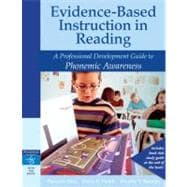
Note: Supplemental materials are not guaranteed with Rental or Used book purchases.
Purchase Benefits
What is included with this book?
Dr. Timothy Rasinski is a professor of education in the Department of Teaching, Leadership, and Curriculum Studies. He teaches graduate and undergraduate courses in literacy education. His major interests include working with children who find reading difficult, phonics and reading fluency instruction, and teacher development in literacy education. He has published over 100 articles and 10 books on various aspects of reading education. Dr. Rasinski is past editor of The Reading Teacher and is currently an editor for the Journal of Literacy Research. He has served as president of the College Reading Association and he currently serves on the Board of Directors of the International Reading Association. He earned bachelor degrees in economics and education at the University of Akron and the University of Nebraska at Omaha. His master's degree in special education also comes from the University of Nebraska at Omaha. Dr. Rasinski was awarded the Ph.D. from The Ohio State University.
Nancy Padak is a Distinguished Professor of Education at Kent State University where she directs the Reading and Writing Center and teaches graduate courses in literacy education and recently received the honor of Kent State University Distinguished Professor. She was a part of the team that wrote the initial grant to fund the state literacy resource center at Kent State University-Ohio Literacy Resource Center (OLRC) and has been a middle school and high school classroom teacher and administrator in a large urban school district. She frequently works with teachers, has written or edited a dozen books and more than 100 scholarly articles. Nancy is a past College Reading Association President and a former Editor of The Reading Teacher. She currently edits the Journal of Literacy Research. Nancy . Nancy has three grown children, Katie, Mike and Matt. Her husband, Gary is Dean of Undergraduate Studies at Kent State. She enjoys reading, traveling, and spending time with family and friends.
Maryann Mraz is a professor in the reading and elementary education department at the University of North Carolina at Charlotte. She teachers graduate courses in literacy education as well as literacy methods courses. She frequently provides professional development workshops to teachers and literacy coaches, and is the author of numerous articles, chapters, and instructional materials on literacy education, including the book Teaching Literacy in Sixth Grade, coauthored with Karen Wood. Her professional interests include literacy coaching, professional development, early literacy, and content area literacy. She earned both a bachelor’s degree in communications and a master’s degree in education from John Carroll University. Dr. Mraz earned her Ph.D. from Kent State University.
| Series Introduction: Evidence-Based Instruction in Reading - A Professional Development Guide | |
| The National Reading Panel Report | |
| Professional Development in Literacy | |
| Using the Books | |
| Overview of Book Contents | |
| Introduction: Phonemic Awareness | |
| Phonemic Awareness - What does research tell us? | |
| What is Phonemic Awareness? | |
| Why is Phonemic Awareness Important? | |
| How Can I Help Students Acquire Phonemic Awareness? | |
| Professional Development Suggestions | |
| Instructional Strategies for Phonemic Awareness Development | |
| General/Guiding Principles for Instruction | |
| Professional Development Suggestions | |
| Strategy Suggestions | |
| Phonemic Awareness Materials and Programs | |
| Professional Development Suggestions | |
| Assessing Phonemic Awareness Development | |
| Big Ideas | |
| Evaluate Your Current Assessment Practices | |
| Ideas for Assessment | |
| Plan for Change | |
| Professional Development Suggestions | |
| Fostering Home-School Connections | |
| Supporting Phonemic Awareness at Home | |
| Literacy Tips for Children Ages 0-3 Years Old | |
| Literacy Tips for Children Ages 4-6 Years Old | |
| Literacy Tips for Children Ages 7-8 years Old | |
| Communicating with Families | |
| Profession | |
| Table of Contents provided by Publisher. All Rights Reserved. |
The New copy of this book will include any supplemental materials advertised. Please check the title of the book to determine if it should include any access cards, study guides, lab manuals, CDs, etc.
The Used, Rental and eBook copies of this book are not guaranteed to include any supplemental materials. Typically, only the book itself is included. This is true even if the title states it includes any access cards, study guides, lab manuals, CDs, etc.